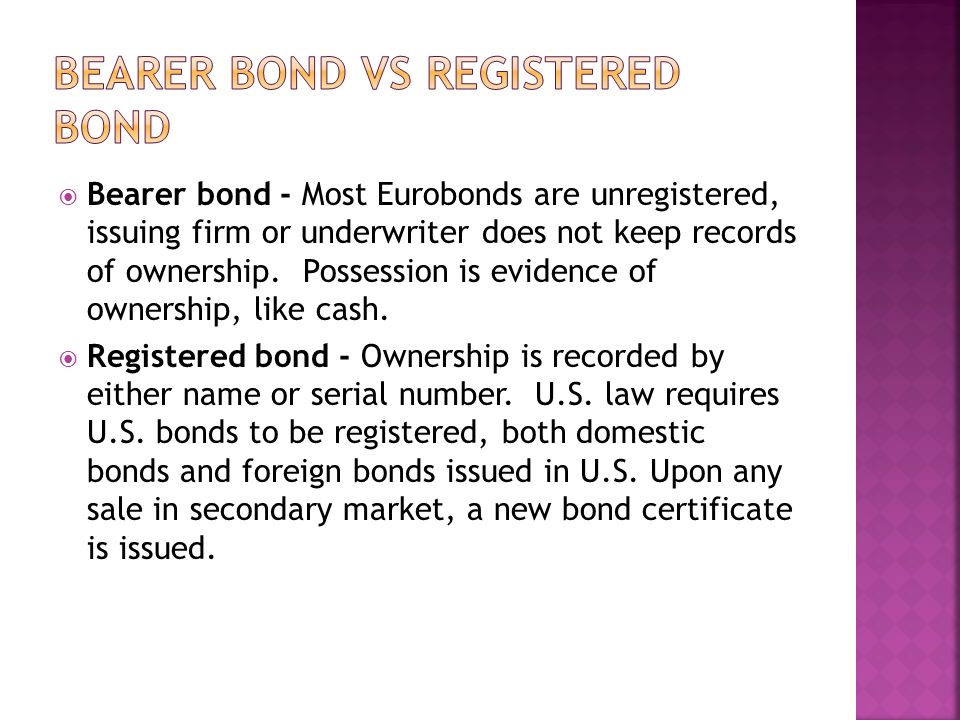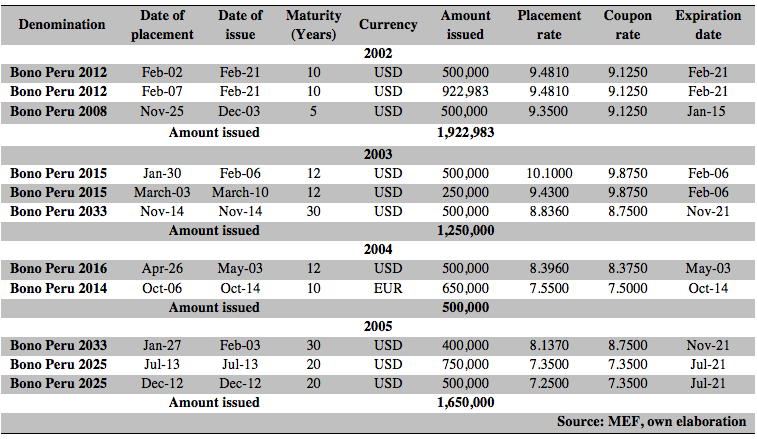How Do I Cash in My Bearer Bonds?Instead, a bond registrar — a person or agency that maintains records of ownership and provides transfer services — uses computerized records to establish ownership. A bearer bond, on the other hand, is issued in the form of a physical certificate that is a negotiable instrument, meaning it can quickly be converted to cash. Therefore, a bearer bond in paper certificate form must be secured against theft or loss as no records of legitimate ownership follow the exchange of the bond. If you want to reap the rewards of a regular income in the form of bond interest payments, you may need to know the difference between bearer and registered bonds. Bearer bonds are payable to the holder, which may change frequently if the bond is sold or traded.
Here’s What Happens When a Bond Is Called
Department of the Treasury while others were issued by banks and financial institutions. Congress prohibited the issuance of new bearer bonds in 1982. Unlike other types of bonds, where ownership is registered, bearer bonds as originally issued could be redeemed by anyone possessing them. Electronic banking changed how bonds were issued and accounted for, according to the New York Times. Because of their anonymity, bearer bonds were often used for tax evasion purposes.Department of Treasury declared a 0.10% rate for EE savings bonds and a composite, or combined, 1.90% interest rate for Series I bonds through Oct. 31, 2019. These rates are comparable to the interest you can earn on some savings accounts but lower than that of some certificates of deposit and money market accounts.
How Do I Cash in My Bearer Bonds?
Series EE savings bonds earn a fixed rate of interest each month for up to 30 years. The rate for new bonds is announced by the Treasury each year on May 1 and November 1. EE bonds purchased before May 2005 have variable interest rates. This type of bond is available in an electronic form and can be purchased in penny increments starting at $25 and up to a maximum of $10,000 per calendar year.

Are bearer bonds like currency?
Bearer bonds are easily transferable anonymous debt instruments that hold certain advantages over other forms of currency. But these very attributes have made bearer bonds a popular vehicle that criminals exploit, to circumvent the law.
MANAGING YOUR MONEY
When a registered bond is sold or traded, ownership records are modified to indicate the transfer of ownership. As a result, whoever physically holds the paper on which the bond is issued, is the presumed owner, giving him or her a greater measure of anonymity than more common bond offerings present.Two types of bearer form certificates are bearer bond and bearer stock certificates. Savings bonds earn interest for 30 years, but rates are relatively low.

Finding Bearer Bonds
Since some bearer bonds issued prior to the ban had maturities of 30 years or more, a few are still around. As with registered bonds, once bearer bonds have matured or been called for early redemption, they no longer pay interest. However, unpaid interest coupons dated on or before a maturity or call date may be redeemed along with the bond itself. American Bearer Bonds are a debt security issued by a business entity, such as a corporation, or by a government.
- Unlike other types of bonds, where ownership is registered, bearer bonds as originally issued could be redeemed by anyone possessing them.
- Congress prohibited the issuance of new bearer bonds in 1982.
- Department of the Treasury while others were issued by banks and financial institutions.
Buying Bearer Bonds
While a bearer bond does not expire per se, it may be hard to cash depending on who issued it. An issuer of a bearer form security keeps no record of who owns the security at any given point in time. That is, whoever produces the bearer certificate is assumed to be the owner of the securities and can collect both dividends and interest payments tied to the security. Ownership is transferred by transferring the certificate, and there is no requirement for reporting the transfer of bearer securities. Securities in bearer form can be used in certain jurisdictions to avoid transfer taxes, although taxes may be charged when bearer instruments are issued.
Bearer Bonds: From Popular to Prohibited
This law removed the option of tax-exempt bonds being issued in bearer form to the public unless the bond matured in one year or less. In addition, under the law the issuer cannot claim interest paid as a tax deduction, reducing the attractiveness of this type of debt obligation to public corporations.
Do bearer bonds still exist?
While bearer bonds aren’t issued in the U.S. any more, a few are still in circulation. If you can find them you can still collect the value, and in some cases interest. Besides buying or inheriting bearer bonds, you can get them in the foreign countries that still allow them to be issued.Bearer bonds work similarly to cash in that the current holder can submit a coupon to the issuer to receive earnings when due. The owner can sell or trade the bond to another investor, who can in turn submit a coupon when the next interest payments are due and receive the earnings. Owners of registered bonds normally do not have to submit a request for interest payments. Instead the issuer or bond registrar knows the identity of the bondholder and will subsequently issue an interest payment to the registered owner of record at the interest due date. Registered bonds are rarely if ever issued in paper form certificates anymore.It differs from the more common types of debt securities in that it is unregistered – no records are kept of the owner (i.e. Joe Takagi), or the transactions involving ownership. In Die Hard, Hans Gruber’s reasoning for taking over Nakatomi in the first place was to steal $640 million in bearer bonds from the vault. A bearer bond is a bond or debt security issued by a business entity such as a corporation, or a government. As a bearer instrument, it differs from the more common types of investment securities in that it is unregistered—no records are kept of the owner, or the transactions involving ownership.Bearer bonds have not been issued by the Treasury since 1986, and all bonds issued today are in book entry form, registered to specific individuals or institutions. If you are looking for an item that will afford you the ultimate in “bragging rights,” this is definitely an item you should bring home this evening. A bearer bond is different than a normal financial bond in that no records are kept of who actually owns it. With a normal bond, a record of the owner is recorded and the individual receives regular payments. However, bearer bonds function like cash in that they can be owned anonymously.In the United States, the Tax Equity and Fiscal Responsibility Act of 1982 substantially curtailed the issue of debt in bearer form. In contrast, registered bonds retained the tax-exempt treatment. Treasury bearer bond with twelve coupons affixed which was issued in February of 1977 and called on February 15, 2002. Issued at its face value of $1,000,000, it is still redeemable for this amount and will be until 2047.Because there is no owner of record, a bearer bond is a handy way to evade taxes. For this reason, Congress banned the issuance of bearer bonds in the United States in 1982.
What is the difference between a zero-coupon bond and a regular bond?
Whoever physically holds the paper on which the bond is issued is the presumptive owner of the instrument. Recovery of the value of a bearer bond in the event of its loss, theft, or destruction is usually impossible. Some relief is possible in the case of United States public debt. Federal laws in the United States changed tax treatment of bearer and registered bonds in the Tax Equity and Fiscal Responsibility Act of 1982.
